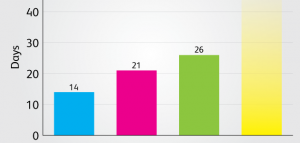We all know that Search Engine Optimization, often abbreviated as SEO, is an essential component of well-rounded digital marketing strategies.
SEO is what helps pages and content be found by searchers on search engines and brings in new visitors to your website.
However, there is one area of digital marketing that many people think doesn’t need to be optimized for SEO: podcasts.
Podcasts, as an audio medium, don’t follow the same rules that written content does for SEO.
But as Google has updated the search engine results page, there is now a need for podcast SEO to be added to the other activities that your brand follows.
In this article, we’ll discuss what podcast SEO is, and how podcasts are now displaying on search engine results pages. We’ll also give you 10 essential tips on how you can start implementing podcast SEO into your own digital marketing strategies.
- What is Podcast SEO?
- Why Does Google Show Podcasts in SERPs?
- Podcast SEO Tips: How to Optimize Your Content
- Wrap Up
What is Podcast SEO?
Let’s clarify a couple of things first.
Podcasts are digital audio files available online for streaming or download that typically follow an episodic format.
Businesses will have a podcast channel and use that format to:
- Explain critical information to audiences.
- Interview industry experts.
- Explore different topics related to the business.
Podcasts are extremely popular for audiences, as they are easy to access and the perfect option for people on the go who can’t sit and read an article or blog.
What about SEO?
Search engine optimization is what drives visitors to a website. If a searcher enters a query and your pages are optimized for that search term, brand new visitors and leads can find your website, blog, and other pages.
In this sense, podcast SEO is the strategy of optimizing your podcasts to boost their visibility on search engine results pages (SERPs). The goal is to increase the chances of potential listeners finding your shows through search traffic.
Why Does Google Show Podcasts in SERPs?
Traditionally, in order to listen to a podcast, an audience member would download a podcast hosting app or search for a specific podcasting channel on Spotify or iTunes.
Most podcasting channels would use basic keywords to appear in the search results on these platforms, but not do much in the way of SEO other than that.
However, updates to the Google algorithm have changed this.
Beginning in 2019, Google announced that it would begin showing podcasts directly on SERPs.
That means that if someone searches for a term and a relevant podcast episode addresses the query, your podcast could appear in the answers.
Google also analyzes and transcribes the content of a podcast to learn more about what relevancy it has for different search terms.
Why Does it Matter?
The ability of your podcast to be found in a Google search has opened up incredible opportunities for businesses.
Before, people would have to have heard of your podcast by name or by industry in order to find your channel on a podcasting app. Now your podcast has massive chances of being discovered that it didn’t before.
Rather than searching for your podcast by name, a user on Google can search for a term that is relevant to a specific episode of your show and discover your entire channel from there.
It also means that optimizing your podcast for SEO is now a critical part of your podcasting strategies.
Podcast SEO Tips: How to Optimize Your Content
The good news is that the content of your podcasts doesn’t need to change in order to optimize your channels for SEO.
Instead, podcast SEO focuses on some of the surrounding details and background tasks that you might not have put much effort into beforehand.
By focusing your time and energy on a few simple changes, you can quickly discover that your podcast SEO strategy is paying off.
Let’s dive into the top ten tips and tactics you can implement for podcast SEO.
1. Add Keywords to Your Podcast Episodes
Keywords are essential to the growth and success of your podcast.
They are the specific terms and phrases that are entered into Google during a search, and you want your pages and podcasts to rank high in those keywords and appear higher on the search results list.
Spending time doing keyword research can help you find the most relevant terms for your podcast episodes.
2. Know the Trends
Creating podcasts that can be found on Google means that your content needs to be relevant to industry trends and emerging topics.
While it’s always good to have some backup ideas for your podcasts, it’s more important to focus on new and relevant trends than background information or general industry news.
By keeping the attention on trends, you can rank higher for the terms that people are searching for more frequently.
3. Understand the Importance of Transcriptions
While Google will do its own transcriptions of your podcast episodes as it scans the audio file, the technology behind it isn’t perfect and, more importantly, it’s not done by you and your brand.
Transcribing your own podcast episodes gives you control over the translation.
You can make sure that relevant terms are clearly defined, insider terminology is correctly spelled, and relevant topics and keywords are highlighted.
Transcriptions are also important from an accessibility standpoint.
People with auditory disabilities should be able to enjoy your podcasts just as much as any other person. Transcriptions help you make your content more accessible.
4. Build Authority with Quality Content
Just as with written content, Google wants to promote content that is more authoritative.
In order to build authority and become recognized as an industry leader by the Google algorithm, you need to have quality content.
Poor quality content won’t get as many views, appeal to audiences, or provide the right information.
Focusing on quality over quantity can help you remain relevant with listeners and build authority.
5. Leverage Podcast Metadata
Metadata, as the name might imply, is data about other data.
In SEO terms, metadata is the behind-the-scenes summary of pages, images, and even podcasts.
Podcast SEO requires you to take advantage of podcast metadata for your needs.
You can add keywords to meta descriptions and meta titles for your podcast pages and help Google learn even more about your podcasts.
6. Take Advantage of Google Podcasts Manager
Just like Google has a Google My Business manager for business owners, there is a Google tool called Google Podcasts Manager that helps you index your podcast and get verified within the Google platform.
By claiming and verifying your podcast channel, there’s a higher chance that Google will promote your podcast and include you in relevant searches.
It also helps you be found across different Google devices like Google Home and Google Assistant.
7. Cross-Promote on Social Media
Promoting your podcast on your other digital channels can help build authority and make you more discoverable.
By cross-promoting your podcast on social media, you can build in more chances to be found in different search engines.
And if Google notices your podcast appearing in more channels, it’s more likely to pull your podcast as a result on a search engine results page.
8. Repurpose Podcasts
The content you post in your podcasts should be relevant, informative, educational, and entertaining for listeners.
That information is incredibly valuable to your organization and should be used in different contexts.
A great podcast episode can be turned into a YouTube video, a blog post, or a downloadable eBook.
By repurposing your podcast content, you can build authority in the content itself and promote the podcast with links on different pages.
9. Create Trust with Backlinks
Backlinks are an essential component of SEO.
A backlink is a link from an external website that goes to one of your pages or podcasts.
By having other websites link to yours, it demonstrates to Google that your pages are authoritative and relevant to audiences. A link building strategy might include tactics like:
- Appearing as a guest on another podcast.
- Asking for reviews.
- Creating visuals of your podcast that other websites can use.
- Having your podcast linked in industry podcast lists.
10. Improve Speed and Responsiveness
No one likes waiting for things to load and buffer, and your podcasts are no exception.
You should spend time making sure your pages have a high speed and are mobile-friendly, regardless of the size of the audio file.
Search engines notice when pages take too long to load and won’t recommend your podcast if it can’t entertain listeners on time.
Wrap Up
Podcasts are a popular form of content that entertains and engages listeners.
Brands that don’t apply podcast SEO practices to their own podcasting networks risk losing out on key growth opportunities and can end up lost in search engine results.
By applying our ten steps for podcast SEO and making sure they are part of your regular tasks, you can help your podcasts rank higher and be found by your audiences.
If you’re interested in learning more about SEO in a podcast format, check out our blog on the best SEO podcasts!
There you’ll see why podcasts are such a popular medium among audiences and explore some of the most valuable channels for discovering more about SEO.

![[WA] Ultimate Content Marketing Kit](https://rockcontent.com/wp-content/uploads/2022/08/Content-Marketing-Kit-750x200px.jpg)








